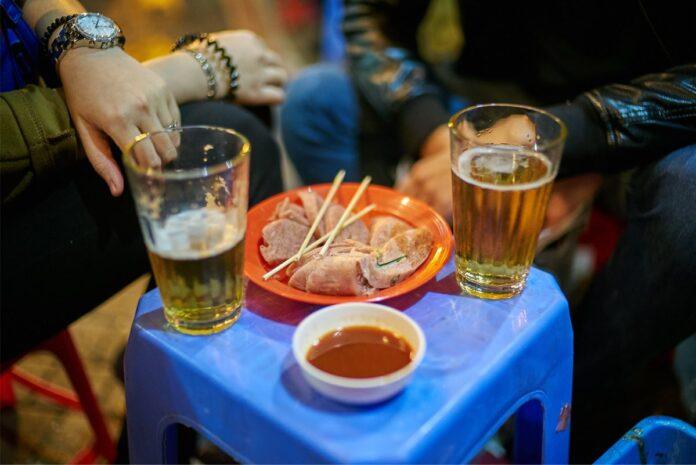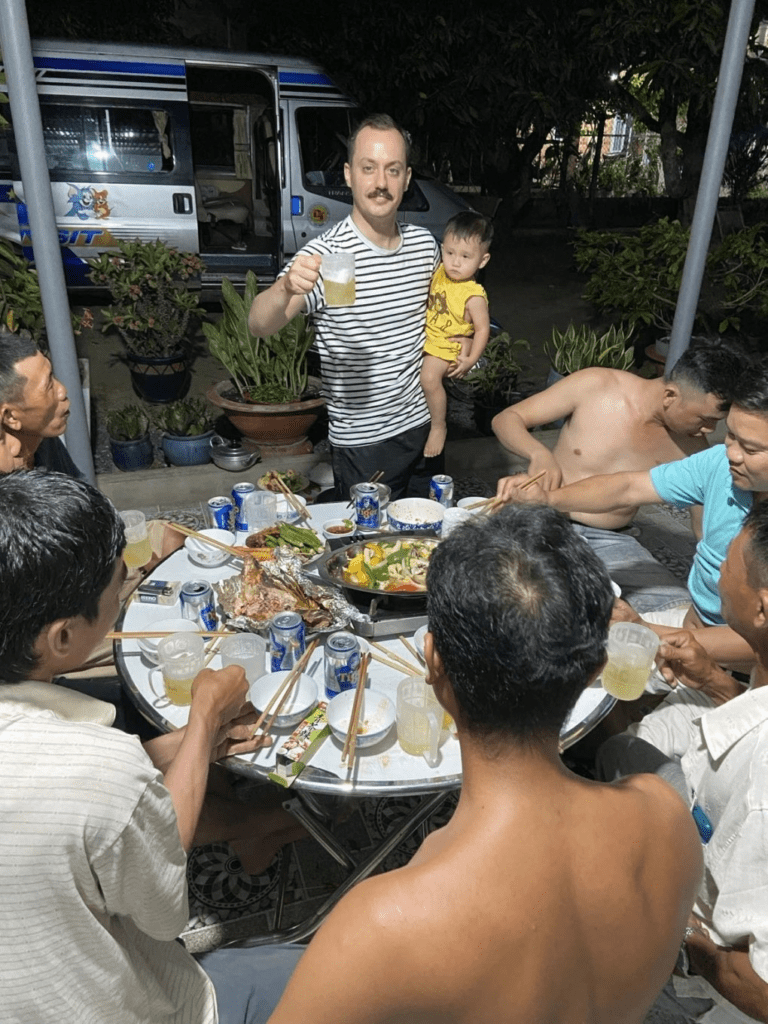[Reading level: B1 – Intermediate]
While walking on the sidewalk in Tan Phu District, Warren was suddenly pulled by a few unfamiliar men and invited to sit down and drink with them.
This unexpected experience in 2019, right after he had just arrived in Ho Chi Minh City, left the British man shocked. Still, Warren sat down. Their drinking table on the roadside was very simple, with a plate of peanuts, some dried squid, and five glasses of beer. They raised their glasses as the traffic bustled right beside them.
“I’ve never had this kind of experience in any other country,” said the 30-year-old. “Vietnamese people invite strangers to drink beer in a very natural and relaxed way.” The four men didn’t speak English, but they used a translation tool to explain to him the drinking culture and the slogan “1, 2, 3 dô (cheers)”.
Warren realized that in Vietnam, drinking follows a shared rule — everyone must raise their glasses together, meaning you have to drink in unison. When someone gives a toast and drinks, he couldn’t just drink alone without responding to the toast. “It created pressure and made me feel awkward,” he said.
But after six years in Vietnam, he realized that drinking isn’t just a fun activity but a way to connect and build social relationships. This is different from England, where people drink according to their own pace, usually in bars, pubs, or gardens, mostly on weekends or holidays. In contrast, in Vietnam, alcohol is present frequently and everywhere — in restaurants, on sidewalks, and in parks.
Personally, Warren doesn’t mind because he has a good alcohol tolerance and enjoys the lively atmosphere, even when the drinking sessions last for hours. He believes the affordability and easy access contribute to the popularity of alcohol in Vietnam. “Here, I can drink all night for the same amount it would cost me just 2 or 3 glasses of beer in England,” he said.
Marcel, a 54-year-old Dutch engineer, was shocked by the amount of alcohol consumed by Vietnamese people. The first time he joined a drinking party was at a wedding, where he witnessed both the groom and father-in-law become so drunk they couldn’t walk and had to be carried. On another occasion, some of his friends got so drunk they fell asleep right on the restroom floor.
During his first few years, he found the constant invitations to drink very uncomfortable. Even after refusing, people would always try to convince him with “just one drink.” The hardest part was when he wanted to stop or didn’t feel like drinking. He noticed that drunk Vietnamese people tend to shout into others’ ears even when only 10 centimeters away.
But after decades in Vietnam, Marcel has learned how to handle it. “In those situations, you just pretend to take a sip and then put the glass down,” he said.
Vietnamese people are also curious about foreigners’ alcohol tolerance, so they often invite him to drink. They tend to put a lot of ice in their beer, which is very strange in the Netherlands. He advises them not to add ice to preserve the beer’s original flavor. But after a few ice-free beers, many already get drunk.
The longer he lives in Vietnam, the more Marcel notices how common it is to raise a glass with strangers — whether in eateries, weddings, or company parties. In restaurants, it’s very common to raise a toast with the neighboring table and compete over who can shout “dzô” louder.
At the same time, the habit of sharing drinking glasses — something considered taboo in the Netherlands — is practiced very casually and openly by Vietnamese people. “Thanks to my friends, I’ve come to understand that this is normal,” he said.
Warren and Marcel are among many who have experienced cultural shock with Vietnam’s drinking habits — a common experience for foreigners living in the country.
“Drinking is a way for people to open up and bond,” said the Frenchman. He grew up in a country with an alcohol culture — red wine and white wine are available everywhere — but the atmosphere of “blending as one” only exists in Vietnam. People often drink 50% or 100% of their glass upon invitation from friends.
He still remembers the first time he drank with a neighbor in his apartment. That person invited more people, they kept ordering more beer and chatting through Google Translate. Everyone was welcome, and by the end of the night, strangers had become close friends.
“And what surprised me most is seeing people who had conflicts reconcile right at the drinking table. In other countries, the situation usually worsens after people drink,” he said.
Source: https://vnexpress.net/nguoi-nuoc-ngoai-soc-voi-van-hoa-nhau-o-viet-nam-4885463.html
WORD BANK:
sidewalk /ˈsaɪd.wɑːk/ (n): vỉa hè
leave sb + Adj /liːv/ [B1] (v): khiến ai đó trong trạng thái gì
peanut /ˈpiː.nʌt/ [B1] (n): đậu phộng
dried squid /draɪd skwɪd/ (n): mực khô
bustle /ˈbʌs.əl/ [C1] (v): rộn ràng, nhộn nhịp
in unison /ɪn ˈjuː.nə.sən/ (adv phrase): đồng thanh, đồng loạt
toast /toʊst/ [B2] (n): lời chúc (khi nâng ly)
awkward /ˈɑː.kwɚd/ [B1] (adj): ngượng ngùng, lúng túng
alcohol tolerance /ˈæl.kə.hɑːl ˈtɑː.lɚ.əns/ (n): tửu lượng
drinking session /ˈdrɪŋ.kɪŋ ˈseʃ.ən/ (n): cuộc nhậu
affordability /əˌfɔːr.dəˈbɪl.ə.t̬i/ (n): giá rẻ, tính vừa túi tiền
groom /ɡruːm/ [B2] (n): chú rể
shout /ʃaʊt/ [B1] (v): hét, la lớn
how to handle sth /ˈhæn.dəl/ [B1] (phrase): cách ứng xử trong trường hợp nào đó
take a sip /teɪk ə sɪp/ (v phrase): nhấp một ngụm
preserve sth /prɪˈzɝːv/ [B2] (v): giữ gìn, bảo tồn cái gì
original flavor /əˈrɪdʒ.ən.əl ˈfleɪ.vɚ/ (n phrase): hương vị gốc
ice-free /aɪs friː/ (adj): không đá
eatery /ˈiː.t̬ɚ.i/ (n): quán ăn
raise a toast /reɪz ə toʊst/ (v phrase): nâng ly chúc mừng
taboo /təˈbuː/ [C1] (n): điều tối kỵ
cultural shock /ˈkʌl.tʃɚ.əl ʃɑːk/ (n): sốc văn hóa
death anniversary /deθ ˌæn.əˈvɝː.sɚ.i/ (n): giỗ chạp
blend /blend/ [B2] (v): hòa trộn
reconcile /ˈrek.ən.saɪl/ [C1] (v): hòa giải
ỦNG HỘ READ TO LEAD!
Chào bạn! Có thể bạn chưa biết, Read to Lead là một trang giáo dục phi lợi nhuận với mục đích góp phần phát triển cộng đồng người học tiếng Anh tại Việt Nam. Chúng tôi không yêu cầu người đọc phải trả bất kỳ chi phí nào để sử dụng các sản phẩm của mình để mọi người đều có cơ hội học tập tốt hơn. Tuy nhiên, nếu bạn có thể, chúng tôi mong nhận được sự hỗ trợ tài chính từ bạn để duy trì hoạt động của trang và phát triển các sản phẩm mới.
Bạn có thể ủng hộ chúng tôi qua 1 trong 2 cách dưới đây.
– Cách 1: Chuyển tiền qua tài khoản Momo.
Số điện thoại 0947.886.865 (Chủ tài khoản: Nguyễn Tiến Trung)
Nội dung chuyển tiền: Ủng hộ Read to Lead
hoặc
– Cách 2: Chuyển tiền qua tài khoản ngân hàng.
Ngân hàng VIB chi nhánh Hải Phòng
Số tài khoản: 012704060048394 (Chủ tài khoản: Nguyễn Tiến Trung)
Nội dung chuyển tiền: Ủng hộ Read to Lead
Lớp luyện thi IELTS online
Bạn đang có nhu cầu thi chứng chỉ IELTS cho đầu vào đại học, đi du học, xin việc hay xin cư trú và đang phân vân chưa biết học ở đâu?
Nếu bạn đang tìm kiếm dịch vụ luyện thi IELTS online với giáo viên uy tín và chất lượng, cũng như học phí phải chăng, thì thầy Trung và Cô Thủy (Admin và dịch giả chính của Read to Lead) có thể là một lựa chọn phù hợp dành cho bạn.
Hãy liên hệ (nhắn tin) tới trang Facebook cá nhân của mình (https://www.facebook.com/nguyen.trung.509) để tìm hiểu về lớp học và được tư vấn cũng như được học thử nha!






